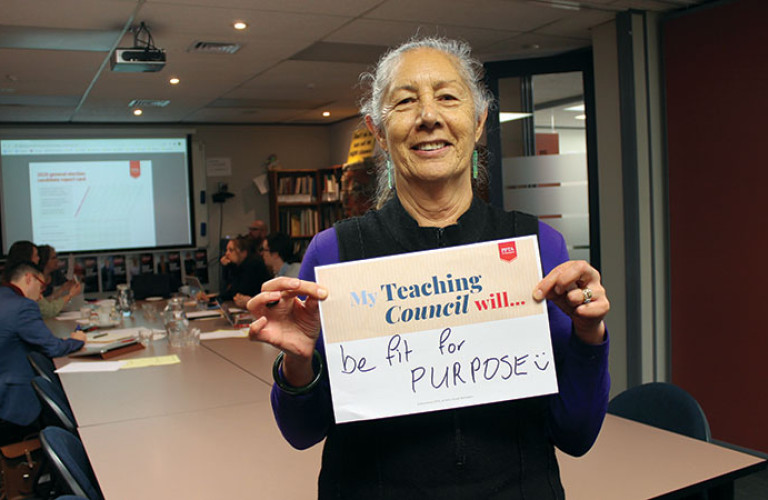A council for teachers
An update on the campaign for a teaching council we can trust.

This year started with branch-based paid union meetings to respond to the teaching council's proposal to increase fees by 125%. PPTA members swung into action at short notice to take part in the consultation process and gave the teaching council a clear message: the increase was inequitable, and the expansion of teaching council activities was unacceptable.
The council, although claiming to be the voice of teachers, did not listen to them. On the first day back at school after Covid-19 lockdown, the final decision about the fees increase was announced. The fees would increase by 115%, and certification would change from triennial to annual. In light of what teachers now saw as a sham consultation, branch-based meetings were called, and teachers voted no confidence in the current teaching council.
A new model
PPTA executive has approved a new model for the teaching council, that would ensure the teaching council doesn't expand beyond its remit and pass on these costs to teachers. The key points about the model:
- The teaching council's purpose and functions are limited to the core tasks that teachers value: initial teacher registration and conduct and competency procedures.
- Significantly increasing the number of representatives of the education sector, including union representatives, on the teaching council board
- Automatic recertification for teachers, unless there is a conduct or competency issue.
- Salaries for staff employed by the teaching council to be linked to the teachers and principals' pay scales.
Lobbying from national office
To get this new model, we need the legislation that governs the teaching council to be changed. The PPTA's campaign is designed to make sure politicians know that this law change – which is easy for them – is hugely important to teachers. PPTA general secretary Michael Stevenson and president Jack Boyle have been meeting with the education spokespeople from each of the major political parties to let them know why this issue is so important to teachers, and asking them to commit to changing this law within their first one hundred days in office.
PPTA members campaign
PPTA members have been doing what they do best and getting the word out that the current state of the teaching council will not do. Regions, branches and individual members have written letters, sent postcards, met with local political candidates, held election panels and taken part in the #mytcwill social media campaign.
Seamus Maher, branch chair at Onslow College, summed up teachers' frustrations in his letter to Minister of Education Chris Hipkins:
I am writing to you in support of the PPTA's request that legislation is changed to ensure that teachers have a teaching council that oversees teacher competency proceedings and administers teacher registration in order to keep professional standards high. No less, no more.
The current act, that defines the teaching council's role, is vague and has allowed for a teaching council that performs a confusing list of functions and has shown ineptitude in responding to, and communicating with, the teaching profession as a whole.
…
Students and parents see the hard work that myself and my teaching colleagues put into students' education. As a result of this, we already have a high status in the community. It's insulting to think that our professional body has a legislated responsibility to boost our status for us.
Meeting with Simon Bridges
Rebecca Holmes, regional chair for Western Bay of Plenty, met with Simon Bridges, who is the National Party MP in her electorate. Mr Bridges, who has family members who are teachers, responded positively to the suggested changes to the teaching council, and stated a wish to keep recruitment, status, and morale of the profession high. He also expressed surprise at the high salaries of the teaching council managerial staff, particularly in comparison to teacher and principal salaries.
Rebecca explained that National's promise to provide government funding for teaching council fees is a good start, but it does not address the other areas of concern such as the change to annual certification or expensive empire building. Mr Bridges gave his personal support for the changes, and drawing on his legal background, felt the changes to the legislation that PPTA is requesting were relatively straightforward. His next steps are to follow up with National education spokesperson Nicola Willis for further action on this issue.
#myTCwill
There is still work to be done to make sure that politicians are convinced of the importance of these issues to teachers and principals alike. If you haven't yet written to your local MP or to a relevant government minister, it's not too late. Writing a letter, asking to meet in person, or joining in our social media actions are still needed to make sure this issue stays front and centre. Check out 'A council for teachers' at ppta.org.nz for everything you need.
Last modified on Wednesday, 17 May 2023 09:11
